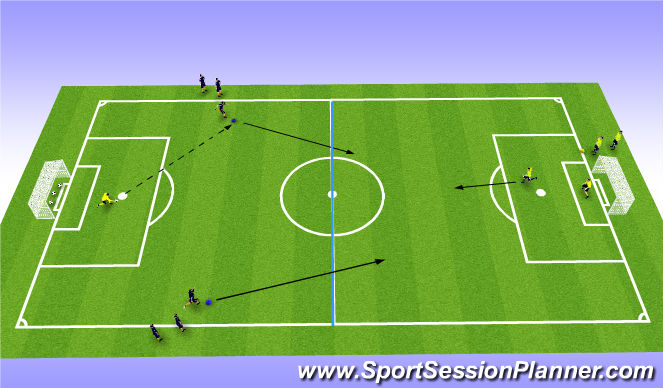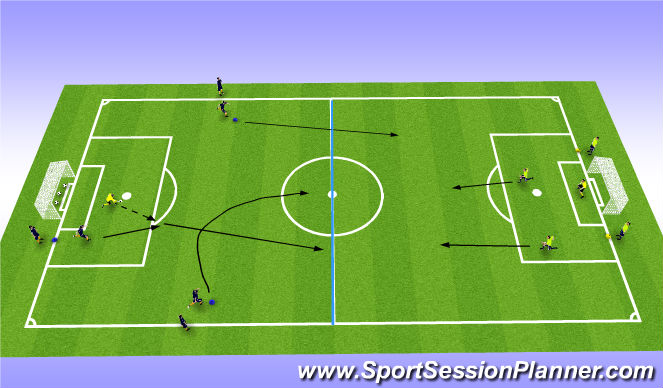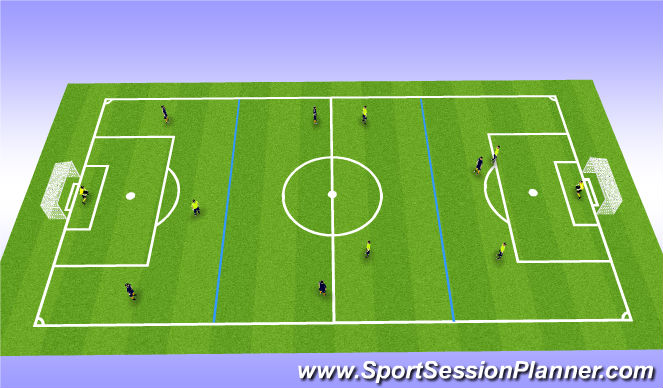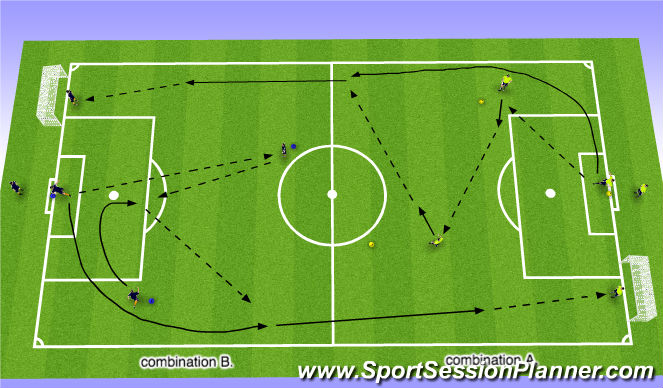Football/Soccer Session (Beginner): Term 2 / Week 7 - Dribbling & RWB

Profile Summary

| Name: | Adam Davidson |
|---|---|
| City: | Sydney |
| Country: | Australia |
| Membership: | Adult Member |
| Sport: | Football/Soccer |
Description
Technical | Dribbling & RWB
Tactical | Combination play vs unorganised opponent
Psychological | Example
Session Objective | in this session I aim to improve our ability to use dribbling & RWB skills to combine effectively with team mates. The purpose being to create and clear space to move towards our objective.

See the guidance at the top of this page to understand why you are not seeing interactive Football/Soccer images.

skill training: 2v1 (15 mins)
Frame
Recognising & creating opportunities to RWB in a numbers up situation (2v1).
Explanation
2v1 overload. Attackers start at blue cones which are inset 3 yards from the sideline. Defenders start at yellow cone on the by-line (3 yards to the side of the large goal). GK in attackers half starts play by playing wide to the attackers: 2v1 to goal. Offside rule = ON. Ball is dead if it leaves the field of play. Play is always restarted by the GK in the attacker's half. Attackers and defenders rotate after each phase of play. After 3-4 minutes; change roles of attackers, defenders and GK's.
Scoring
Attackers = 1 goal for scoring 2v1.
Defenders = 1 goal for regaining possession & RWB into the opposition half; 2 goals for scoring against the opposition GK.
Coaching points
1. Who directs the attack? The player ON the ball - if he drives quickly into the opposition half, he forces a defender to commit and leave space behind for team mates to exploit.
2. The player ON the ball - their choice of direction & speed, will affect affect passing options, RWB opportunities and the movement of their team mate who is supporting the attacking.
3. Complementary movement & the player OFF the ball - they have the power to (i) create space for themselves, or (ii) clear space for the play in possession. We're interested in creativity, unselfish runs & how players react to their team mates movement with the ball.

See the guidance at the top of this page to understand why you are not seeing interactive Football/Soccer images.

skill training: 3v2 (15 mins)
Frame
Recognising & creating opportunities to RWB in a numbers up situation (3v2).
Explanation
3v2 overload. Attackers start at blue cones (i) two of which are inset 3 yards from the sideline, and (ii) another 3 yards to the side of the GK. Defenders start at yellow cones on the by-line which are 3 yards to the side of the large goal. GK in attackers half starts play by playing to one of 3: 3v2 to goal. Offside rule = ON. Ball is dead if it leaves the field of play. Play is always restarted by the GK in the attacker's half. Attackers and defenders rotate after each phase of play. After 3-4 minutes; change roles of attackers, defenders and GK's.
Scoring
Attackers = 1 goal for scoring 2v1.
Defenders = 1 goal for regaining possession & RWB into the opposition half; 2 goals for scoring against the opposition GK.
Coaching points
1. triggers and cues for unselfish runs: if a winger in possession runs in-field could this be a cue for the central player to overlap into the space that's left behind?
2. if the player off the ball makes a surging FWD run, might this take a defender away from a team mate in possession? - clearing space for them to carry the ball FWD closer to goal.
3. if central and wide players are beginning to spot cues / triggers to rotate - can we be quick and creative to stretch the opposition and create opportunitie to play / run through into space behind?

See the guidance at the top of this page to understand why you are not seeing interactive Football/Soccer images.

tactical component (20 mins)
Frame
Consolidating the theme of attacking overloads, we finish with a game that emphasises the importance of combination play vs an unorganised opponent. Again, creating and clearing space to RWB will be a key feature.
Explanation
5aside pitch divided into thirds. Two teams of 6 players each set up as GK-2-2-1. In possession, players can enter any third of the pitch. Out of possession, players are limited to their designated third e.g. midfielder limited to the middle third etc.
Progression
1. Players can go in any third, both in and out of possession. If teams create and score from overlaps, underlaps or overloads = 2 goals.
Coaching Points
1. Complimentary movement to create & clear space for one another to travel FWD with the ball.
2. Good habits like checking shoulders, first touch facing FWD, being direct & driving forward when space is available - will allow us to create attacking overloads.
3. Creativity is key - let's see overlaps, underlaps, one-twos & through balls; don't be afraid to experiment. You may discover new ways to achieve the same goal - show us something different!









 Play animation
Play animation Play step-by-step
Play step-by-step Repeat (toggle)
Repeat (toggle) Full Screen
Full Screen Pause
Pause Stop
Stop
skill introduction (15 mins)
Frame
Introducing players to cues / triggers to RWB; understanding how to create & clear space for each other through complementary movement coupled with combination play e.g. one-twos, overlaps, underlaps etc.
Explanation
Across both combinations, both the right-back and centre-midfielder remain in their positions until the coach decides to rotate players after 2-3 minutes. All other players will be move positions and alternate between being an attacker and a goalkeeper.
Combination A - first attacker at the by-line plays a pass to the right-back. Right-back drives in-field on their first touch, as the attacker makes an overlap. Right-back plays to centre-midfielder who receives facing FWD & plays a through ball for the advancing attacker. Attacker finishes with a shot on goal before becoming the goalkeeper. GK takes the ball and become an attacker at the cone on their right.
Combination B - first attacker at the by-line plays a pass to the centre-midfielder and overlaps the Right-back. The Right-back bends a run in-field as the centre-midfielder plays a pass back to them. Right-back receives facing FWD and plays a through ball for the advancing attacker. Attacker finishes with a shot on goal before becoming the goalkeeper. Goalkeepers takes their ball and joins the attackers at the cone to the right.
Coaching points
1. attackers - hold your run & time it right. Always allow your team mates to play the ball in front of you in such a way that you don't need to break stride.
2. right-back - taking your first touch to drive in field will be a trigger / cue for the attacker to overlap into the space you have cleared.
3. centre-midfielder - check the shoulders and look to, as often as possible, receive the ball facing FWD; it'll help the advancing attacker to continue driving forward at the same pace without having to break stride.
Ultimately, we want to draw attention to the triggers & cues that will help us create and clear space to RWB - "it's the little details that are vital. Little things make big things happen."